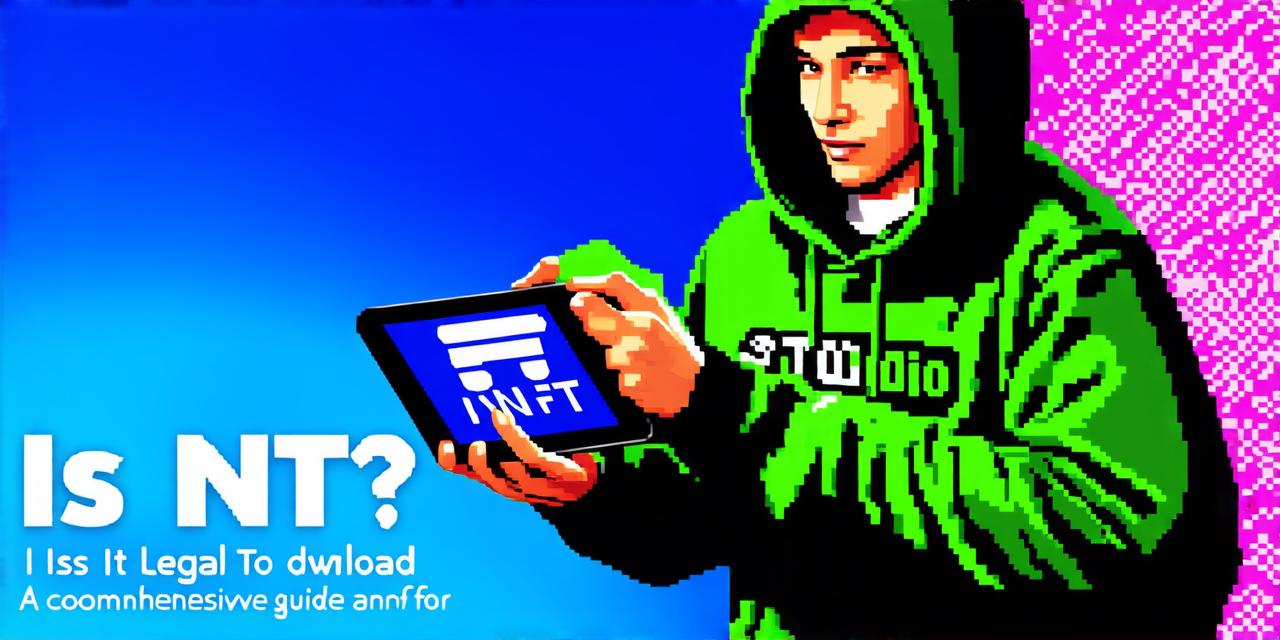What are NFTs?
NFTs are unique digital assets that are stored on a blockchain, allowing for secure and transparent ownership and transfer. They can represent anything from art to collectibles to in-game items, and have the potential to revolutionize the way we buy, sell, and trade digital assets.
Is it Legal to Download an NFT?
The legality of downloading and using NFTs varies depending on where you are located and the specific laws that apply to your region. In general, NFT ownership and use is legal as long as you have purchased the asset through a reputable platform and have been granted the necessary rights and permissions to use it.
However, there are some important considerations to keep in mind when downloading and using NFTs. First, it’s important to understand the terms of service of the platform where you purchase the asset. Some platforms may require you to agree to certain restrictions or limitations on how you can use the asset, while others may allow for more freedom and flexibility.
Additionally, some countries have specific laws that govern the ownership and use of digital assets. For example, in China, it is illegal to buy, sell, or trade cryptocurrencies without the proper licenses, which could potentially apply to NFTs as well. In the United States, there are ongoing debates about whether NFTs should be classified as securities or commodities, which could have implications for how they can be bought, sold, and traded.
Best Practices for Protecting Your NFT Assets
Regardless of the legal framework surrounding NFT ownership and use, it’s important to take steps to protect your assets. Here are some best practices to keep in mind:
-
Store your NFTs securely: One of the biggest risks associated with NFT ownership is the potential for hacking or theft. To minimize this risk, it’s important to store your NFTs on a secure platform that uses strong encryption and other security measures.
-
Back up your NFTs regularly: In addition to storing your NFTs securely, it’s also important to back them up regularly in case something goes wrong with the platform where they are stored. This could involve using a cloud-based storage service like Dropbox or Google Drive, or keeping a copy on a physical device like a USB drive.
-
Understand your rights and permissions: As mentioned earlier, it’s important to understand the terms of service of the platform where you purchase your NFTs. This will help you to know what you are allowed to do with the asset, and what restrictions or limitations may apply.
-
Keep track of market trends: Finally, it’s a good idea to stay up-to-date on market trends and developments in the NFT space. This can help you to make informed decisions about which assets to buy, sell, or trade, as well as how to protect your own investments.
FAQs
Q: Is it legal to download an NFT in my country?
A: The legality of downloading and using NFTs varies depending on where you are located and the specific laws that apply to your region. It’s important to research the laws in your area and understand the terms of service of the platform where you purchase your assets.
Q: How do I store my NFTs securely?
A: There are several options for storing NFTs securely, including MetaMask, MyEtherWallet, and Trust Wallet. These platforms use strong encryption and other security measures to protect your assets from hacking or theft.

Q: Do I need to back up my NFTs?
A: Yes, it’s a good idea to back up your NFTs regularly in case something goes wrong with the platform where they are stored. This could involve using a cloud-based storage service like Dropbox or Google Drive, or keeping a copy on a physical device like a USB drive.
